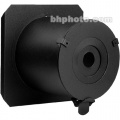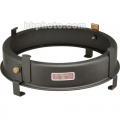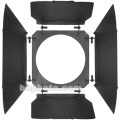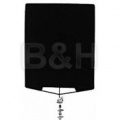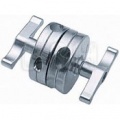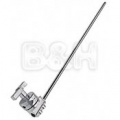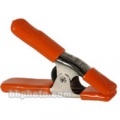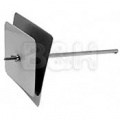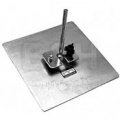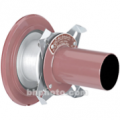Difference between revisions of "3D Lab Glossary"
From Help Wiki
(→Lighting Equipment and Technology) |
(→Basic Terminology) (Tag: VisualEditor) |
||
| (14 intermediate revisions by 2 users not shown) | |||
| Line 1: | Line 1: | ||
| + | __NOTOC__ | ||
===Basic Terminology=== | ===Basic Terminology=== | ||
| + | ====Animation==== | ||
| + | * '''Armature''': a skeleton type frame used to give support or rigidity to clay or other malleable material. The skeletal frame will normally have ball and socket or hinged joints or readily bendable joints in the case of a wire armature to mimic the joints (elbows , knees, neck etc.) of human or animal figures. | ||
| + | * '''Onion Skinning''': lets you see a previously captured frame over the Live View frame. | ||
| + | * '''Live View''': the live video feed from the camera. It is lower resolution than the captured imaged | ||
| + | * '''Low-res video assist''': the live view feed is lower quality and does not accurately represent the exposure of the shot. | ||
| + | * '''High-res''': Dragonrrame also captures high resolution stills of each frame. High-Res button let's you toggle between low-res and high-res in the Animation Timeline. | ||
| + | * '''Aspect Ratio''': is the proportional relationship between width and height. Standard definition video is 4:3 and HD video is 16:9. | ||
| + | * '''Action Safe/Title Safe''': Some televisions can cut off the edges of the picture. The action safe guide outline the border in which to keep the important content the title safe guide is the area where titles should be placed to avoid being cut off. | ||
| + | |||
| + | ====Lights==== | ||
| + | * '''Bash light''': The bash light is an work light that turns on in-between shooting. When capturing frames it is on for the low-res video assist but it turns off for the high-res capture. | ||
| + | * '''Tungsten Lights''': The older light lights in the lab use incandescent tungsten bulbs. They can can get extremely hot. Always use leather gloves when handling the lights or accessories. | ||
| + | * '''LED Lights''': LED lights use less electricity and do not generate as much heat. | ||
| + | * '''DMX''': Is a standard for controlling lighting. The LED lights in the lab built in DMX controls. | ||
| + | * '''DMX Cable''': DMX normally uses a 5 pin or 3 pin xlr cable. The Inca 4 lights in the lab use ethernet cables for DMX. | ||
| + | * '''DMX Dimmer Pack''': There is a 4 channel DMX dimmer pack for controlling the tungsten lights. Connect the power cables of the lights to the dimmer and they can be controlled buy DMX. | ||
| + | * '''Ethernet Cable''': A cable for connecting computers to networks. Also used for DMX on some lights. | ||
| + | |||
| + | |||
| + | <!-- Hidden====Camera==== | ||
| + | * F-stop: determines how much light is let through the lens. | ||
| + | * Aperture | ||
| + | * ISO | ||
| + | * Shutter Speed--> | ||
===Lighting Equipment and Technology=== | ===Lighting Equipment and Technology=== | ||
* Snoots, Barndoors, Grids, and Filters are essential accessories for any lighting system. These devices alter the shape, intensity, or color of the light output. Consider them as a painter would a brush, or a sculptor would a knife, or chisel. | * Snoots, Barndoors, Grids, and Filters are essential accessories for any lighting system. These devices alter the shape, intensity, or color of the light output. Consider them as a painter would a brush, or a sculptor would a knife, or chisel. | ||
| − | * Snoot | + | * '''Snoot''' |
** 2-in-1 snoot. A different opening is derived by removing the mask. Use of a snoot will result in a small circle of light, when it is attached to the front of your light source. The size of the circle of light will be determined by the opening of the snoot, its length, and the distance of the subject. | ** 2-in-1 snoot. A different opening is derived by removing the mask. Use of a snoot will result in a small circle of light, when it is attached to the front of your light source. The size of the circle of light will be determined by the opening of the snoot, its length, and the distance of the subject. | ||
| + | <gallery> | ||
| + | File:3d-snoot.jpg | ||
| + | </gallery> | ||
| − | * Accessory Holder | + | * '''Accessory Holder''' |
** This item is essential for mounting barndoors, glass filters, or diffusion or color gels to the front of a light | ** This item is essential for mounting barndoors, glass filters, or diffusion or color gels to the front of a light | ||
| + | <gallery> | ||
| + | File:3d-access-holder.jpg | ||
| + | </gallery> | ||
| − | + | * '''Barndoors''' | |
| − | * Barndoors | + | |
** Barndoors narrow the beam spread of a light fixture. They help create a 3-dimensional look to a lighting scheme by placing light in a specific area, or by keeping it away. | ** Barndoors narrow the beam spread of a light fixture. They help create a 3-dimensional look to a lighting scheme by placing light in a specific area, or by keeping it away. | ||
** The more leaves a barndoor set has, or the longer the leaves the more precisely the beam can be controlled | ** The more leaves a barndoor set has, or the longer the leaves the more precisely the beam can be controlled | ||
| + | <gallery> | ||
| + | 3d-barndoors.jpg | ||
| + | </gallery> | ||
| − | * Flag | + | * '''Flag''' |
** Flags are square or rectangular frames with mounting pins attached. Used to control natural or artificial light. Can be used to protect the camera lens from flares, control spill light from other sources, or keep light from reaching an area on the set. | ** Flags are square or rectangular frames with mounting pins attached. Used to control natural or artificial light. Can be used to protect the camera lens from flares, control spill light from other sources, or keep light from reaching an area on the set. | ||
| + | <gallery> | ||
| + | file:3d-blackflag.jpg | ||
| + | </gallery> | ||
| − | * Grip Head | + | * '''Grip Head''' |
** The Grip Head functions as a grabber for the thing being grabbed -- a flag, a fixture, stud, or a small arm. | ** The Grip Head functions as a grabber for the thing being grabbed -- a flag, a fixture, stud, or a small arm. | ||
| + | <gallery> | ||
| + | file:3d-griphead.jpg | ||
| + | </gallery> | ||
| − | * Extension Arm | + | * '''Extension Arm''' |
**Extension arm for extra lift or reach. It can hold a small light head, a flag, gobo, or reflector. | **Extension arm for extra lift or reach. It can hold a small light head, a flag, gobo, or reflector. | ||
| − | < | + | <gallery> |
file:3d-extension-arm.jpg | file:3d-extension-arm.jpg | ||
| − | </ | + | </gallery> |
| − | * “A” Clamp or Pony Spring Clamp | + | |
| + | * '''“A” Clamp or Pony Spring Clamp''' | ||
** This is the classic "A" clamp -- strong, rust-resistant, durable. This size is perfect for holding a reflector board, gathering cloth backgrounds or drapes, or securing a roll of seamless paper to its crossbar. Features plastic end tips to avoid marring delicate finishes, and plastic handle caps for comfort. | ** This is the classic "A" clamp -- strong, rust-resistant, durable. This size is perfect for holding a reflector board, gathering cloth backgrounds or drapes, or securing a roll of seamless paper to its crossbar. Features plastic end tips to avoid marring delicate finishes, and plastic handle caps for comfort. | ||
<gallery> | <gallery> | ||
File:3d-a-clamp.jpg | File:3d-a-clamp.jpg | ||
</gallery> | </gallery> | ||
| − | |||
| − | * Cantrell Holder | + | * '''Cantrell Holder''' |
** A 3/8" shaft is, threaded at one end with square plates attached. The foam core is speared, and the white plate is then mounted on the foam with the wing nut. The shaft can be mounted into a Grip Head, the foam can then be placed & held in position. | ** A 3/8" shaft is, threaded at one end with square plates attached. The foam core is speared, and the white plate is then mounted on the foam with the wing nut. The shaft can be mounted into a Grip Head, the foam can then be placed & held in position. | ||
<gallery> | <gallery> | ||
| Line 39: | Line 78: | ||
</gallery> | </gallery> | ||
| − | * Foam Core Holder | + | * '''Foam Core Holder''' |
** The foam core or bead board is taped to the flat plate. The Foam Core Holder is also often used to hold small mirrors for reflecting Xenon light beams around a set. | ** The foam core or bead board is taped to the flat plate. The Foam Core Holder is also often used to hold small mirrors for reflecting Xenon light beams around a set. | ||
<gallery> | <gallery> | ||
| Line 45: | Line 84: | ||
</gallery> | </gallery> | ||
| − | * Scrim | + | * '''Scrim''' |
**Scrims are metal screen mounted in a metal frame. They are placed in front of a light to reduce light intensity. There are four different types of scrims. Full single- this scrim covers the entire lightface and reduces the intensity of the entire light beam. | **Scrims are metal screen mounted in a metal frame. They are placed in front of a light to reduce light intensity. There are four different types of scrims. Full single- this scrim covers the entire lightface and reduces the intensity of the entire light beam. | ||
| + | <gallery> | ||
| + | file:3d-scrim.png | ||
| + | </gallery> | ||
| − | * Focal Spot | + | * '''Focal Spot''' |
** Operating like a snoot, Focal Spots focus light through two glass convex lenses to produce a concentrated beam of light with a smooth field of maximum intensity and sharp edges. | ** Operating like a snoot, Focal Spots focus light through two glass convex lenses to produce a concentrated beam of light with a smooth field of maximum intensity and sharp edges. | ||
| − | + | <gallery> | |
| + | file:3d-focal-spot.png | ||
| + | </gallery> | ||
[[Category:Animation Labs]] | [[Category:Animation Labs]] | ||
Latest revision as of 14:55, 15 October 2021
Basic Terminology
Animation
- Armature: a skeleton type frame used to give support or rigidity to clay or other malleable material. The skeletal frame will normally have ball and socket or hinged joints or readily bendable joints in the case of a wire armature to mimic the joints (elbows , knees, neck etc.) of human or animal figures.
- Onion Skinning: lets you see a previously captured frame over the Live View frame.
- Live View: the live video feed from the camera. It is lower resolution than the captured imaged
- Low-res video assist: the live view feed is lower quality and does not accurately represent the exposure of the shot.
- High-res: Dragonrrame also captures high resolution stills of each frame. High-Res button let's you toggle between low-res and high-res in the Animation Timeline.
- Aspect Ratio: is the proportional relationship between width and height. Standard definition video is 4:3 and HD video is 16:9.
- Action Safe/Title Safe: Some televisions can cut off the edges of the picture. The action safe guide outline the border in which to keep the important content the title safe guide is the area where titles should be placed to avoid being cut off.
Lights
- Bash light: The bash light is an work light that turns on in-between shooting. When capturing frames it is on for the low-res video assist but it turns off for the high-res capture.
- Tungsten Lights: The older light lights in the lab use incandescent tungsten bulbs. They can can get extremely hot. Always use leather gloves when handling the lights or accessories.
- LED Lights: LED lights use less electricity and do not generate as much heat.
- DMX: Is a standard for controlling lighting. The LED lights in the lab built in DMX controls.
- DMX Cable: DMX normally uses a 5 pin or 3 pin xlr cable. The Inca 4 lights in the lab use ethernet cables for DMX.
- DMX Dimmer Pack: There is a 4 channel DMX dimmer pack for controlling the tungsten lights. Connect the power cables of the lights to the dimmer and they can be controlled buy DMX.
- Ethernet Cable: A cable for connecting computers to networks. Also used for DMX on some lights.
Lighting Equipment and Technology
- Snoots, Barndoors, Grids, and Filters are essential accessories for any lighting system. These devices alter the shape, intensity, or color of the light output. Consider them as a painter would a brush, or a sculptor would a knife, or chisel.
- Snoot
- 2-in-1 snoot. A different opening is derived by removing the mask. Use of a snoot will result in a small circle of light, when it is attached to the front of your light source. The size of the circle of light will be determined by the opening of the snoot, its length, and the distance of the subject.
- Accessory Holder
- This item is essential for mounting barndoors, glass filters, or diffusion or color gels to the front of a light
- Barndoors
- Barndoors narrow the beam spread of a light fixture. They help create a 3-dimensional look to a lighting scheme by placing light in a specific area, or by keeping it away.
- The more leaves a barndoor set has, or the longer the leaves the more precisely the beam can be controlled
- Flag
- Flags are square or rectangular frames with mounting pins attached. Used to control natural or artificial light. Can be used to protect the camera lens from flares, control spill light from other sources, or keep light from reaching an area on the set.
- Grip Head
- The Grip Head functions as a grabber for the thing being grabbed -- a flag, a fixture, stud, or a small arm.
- Extension Arm
- Extension arm for extra lift or reach. It can hold a small light head, a flag, gobo, or reflector.
- “A” Clamp or Pony Spring Clamp
- This is the classic "A" clamp -- strong, rust-resistant, durable. This size is perfect for holding a reflector board, gathering cloth backgrounds or drapes, or securing a roll of seamless paper to its crossbar. Features plastic end tips to avoid marring delicate finishes, and plastic handle caps for comfort.
- Cantrell Holder
- A 3/8" shaft is, threaded at one end with square plates attached. The foam core is speared, and the white plate is then mounted on the foam with the wing nut. The shaft can be mounted into a Grip Head, the foam can then be placed & held in position.
- Foam Core Holder
- The foam core or bead board is taped to the flat plate. The Foam Core Holder is also often used to hold small mirrors for reflecting Xenon light beams around a set.
- Scrim
- Scrims are metal screen mounted in a metal frame. They are placed in front of a light to reduce light intensity. There are four different types of scrims. Full single- this scrim covers the entire lightface and reduces the intensity of the entire light beam.
- Focal Spot
- Operating like a snoot, Focal Spots focus light through two glass convex lenses to produce a concentrated beam of light with a smooth field of maximum intensity and sharp edges.

